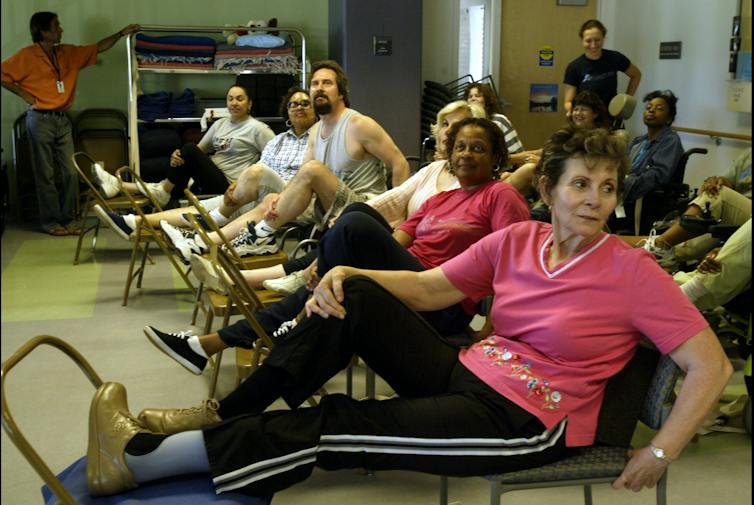
Imagine standing on a stage in front of a live audience – as well as millions of TV viewers around the world.
How would you feel? Excited? Nervous? Scared?
How about if you were recently diagnosed with Multiple Sclerosis (MS) – an autoimmune condition that affects the nervous system – and this is one of your first public appearances since then?
A thrilling but challenging experience may well feel much more difficult, both physically and emotionally.
That was the case for actor Christina Applegate when she appeared as a presenter and nominee at the 75th Primetime Emmy Awards ceremony 15th January 2024.
The Dead to Me star, who publicly shared her diagnosis in 2021, was visibly moved by the standing ovation she received from her Hollywood contemporaries.
Like her friend and fellow Hollywood star, Selma Blair, Applegate has been characteristically frank in interviews about her experience of MS – and often highlights the added difficulties faced by those living with the condition. As she told Vanity Fair in 2023:
With the disease of MS, it’s never a good day. You just have little s***** days. People are like, “Well, why don’t you take more showers?” Well, because getting in the shower is frightening. You can fall, you can slip, your legs can buckle … It’s frightening to me to get in there. There are just certain things that people take for granted in their lives that I took for granted. Going down the stairs, carrying things —- you can’t do that anymore. It f****** sucks.
MS is a lifelong condition and there’s currently no cure, but medications and lifestyle interventions can help manage the disease and offer hope to those living with it.
What is MS?
MS is a condition that affects the brain and spinal cord.
In a person with MS, the immune system, which usually fights off infections, mistakenly attacks the protective sheath covering nerve fibres, which leads to a breakdown in communication between the brain and the rest of the body.
Over time, this relentless assault can result in permanent damage, causing an array of potential symptoms including fatigue, vision problems, balance and coordination difficulties, muscle weakness, increased muscle tone and stiffness, pain and sensory impairment, cognitive changes, emotional and mood changes, and bladder and bowel problems.
But MS is different for everyone and no two people will experience the same symptoms or progression of the condition.
Generally, however, there are two types of MS, relapsing or progressive, and each affect the body differently.
The most common form is the relapsing remitting type, characterised by periods of symptom exacerbation – attacks – followed by periods of remission – recovery.
Over time, the number of relapses typically decreases, but there’s a gradual worsening that can occur, leading to continuous progression known as secondary progressive MS.
The other type is primary progressive MS, a form marked by a gradual and continuous worsening of symptoms from the outset.
Mobility tends to be a central issue for those living with either type of MS.
Research suggests that historically, people with relapsing remitting MS often find themselves relying on walking aids approximately two decades after the onset of the disease.
Those with primary progressive MS, however, may need to use walking aids earlier.
The root cause of MS remains elusive. Research has shown that a range of genetic and environmental factors may contribute to the development of MS, including levels of vitamin D or sunlight exposure, the Epstein–Barr virus infection, obesity, and smoking.
MS can affect people from all backgrounds – including Hollywood stars – and age groups, although it’s typically diagnosed between ages 20 to 40.
The condition is two to three times more common in women than men – and, while it’s an increasing global challenge, the highest prevalence is in North America, western Europe, and Australasia.
Hope for those living with MS
Despite being a lifelong condition with the potential for progressing disability, MS is not without hope.
While a definitive cure remains elusive, a multitude of treatment options exist to manage the condition.
Disease-modifying therapies have proven effective in preventing attacks and slowing progression – and can extend the duration before walking assistance becomes a necessity.
Many experts now recommend initiating these therapies early in the disease course to guard against disability.
Additionally, when it comes to managing the symptoms of neurological dysfunction, there are treatments that focus on addressing specific symptoms. These treatments often combine both medication and physical therapies. For example, if someone with MS experiences muscle spasms, therapy could involve taking a particular medication as well as physiotherapy to alleviate that symptom.
Scientific evidence strongly suggests that exercise is helpful in managing physical symptoms of MS, as well as fatigue, mood, and cognition.

Ricardo Dearatanha/Los Angeles Times via Getty Images
Some studies even suggest that exercise may have disease-modifying effects – preventing attacks and progression in a manner comparable to MS medication.
Furthermore, there is potential for exercise and physical activity to reduce the risk of developing MS, although, so far, most evidence for the disease-modifying and risk reducing effects of exercise and physical activity comes from animal models of MS, not human studies.
Diet is another crucial factor in managing MS. Vitamin D deficiency and obesity are both potential risk factors in the development of MS so it’s essential to maintain a healthy, varied diet.
For instance, the consumption of fruits and vegetables has been recently linked to a potential protective effect against MS.
Besides the protective aspects of diet, there is preliminary evidence to suggest that a healthy diet has potentially positive effects on symptoms of MS.
For those facing the challenges of MS, it’s crucial to adopt a holistic approach, which includes both medication and healthy lifestyle choices, to managing the condition. Physical activity, avoidance of smoking, eating a good diet, and medical interventions are all powerful tools in reshaping the story of life with MS.
![]()
Turhan Kahraman does not work for, consult, own shares in or receive funding from any company or organisation that would benefit from this article, and has disclosed no relevant affiliations beyond their academic appointment.



























